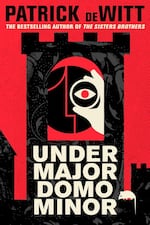
DeWitt, a native of Canada, now lives in Portland.
April Baer / OPB
Portland writer Patrick DeWitt's new novel, "Undermajordomo Minor", begins with a fairytale premise: An aimless young man enters the service of a mysterious master. He's confounded by the secrets around every corner of his new home. A charismatic pickpocket keeps making off with his pipe. And the love of his life cannot shake herself loose from a handsome rival. It's another bracing, propulsive tale from the creator of 2011's hit, "The Sisters Brothers", full of sharp, understated dialogue and an unexpectedly poignant embrace of life's contradictions. DeWitt reads at Powell's Tuesday night. We talked with DeWitt about his process, his protagonist, Lucien (Lucy) Minor, and the unnamed Alpine spot where the book takes place.
Q&A with Patrick DeWitt
April Baer: The seeker gone up to the mountain is a pretty classic point of literary departure.
Patrick DeWitt: I enjoy the idea of starting off with something very familiar and maybe spinning it to my own tune later on down the line. The books that inspired this book — at the beginning anyway — were traditional fables and fairytales from Central Europe and Eastern Europe. I wanted to address the differences of the classes, the aristocrats, and people who worked beneath them. I wanted to show the aristocrats at their darkest; let's see how far these people want to go. You're just along for the ride.
April Baer: This story unfolds in short chapters, like "The Sisters Brothers" did. What feels right to you about bite-sized portions?
Patrick DeWitt: I remember after I finished "The Sisters Brothers", somebody told me they admired that each chapter was essentially five pages. That had not occurred to me until this person pointed out to me, and I didn't realize I was doing it. It was much the same with this book, but the chapters are even shorter.
April Baer: Do you write them sequentially?
Patrick DeWitt: I wrote this book mostly sequentially, and I tend to write sequentially, yeah.
April Baer: There's this thing that happens — it's not exactly a defiance of continuity — but you don't always finish one chapter and go right on to tell us what happened next. I feel like sometimes writers will grind out the periods between their good ideas. Do you ever go back and read what you've written and ask yourself, "Do I need to fill something in here, or can it just stand by itself"?
Patrick DeWitt: I think that I typically over-write, it's very common I'm sure. You over-write and then you chip away until you're down to the fundamentals. Often times I find myself in a position of working through one of those grinds, and recognize that if I am feeling that way, then perhaps that part should be cut, or there's some way to minimize it, a quicker way to get from A to B.

DeWitt's narrator, Lucy Minor, is peopled with charming, shiftless types, not the least of them his narrator, Lucy Minor.
Ecco Press/Harper Collins
April Baer: Lucy has this moment in which he's about to surrender to defeat, and he realizes he's taking solace in giving up. Is that a mirror to any moments you had at the keyboard?
Patrick DeWitt: Well, in my first book, "Ablutions," there's a recurring phrase where the protagonist is discussing a desire to be killed. Whenever I would watch scary movies as a child, and someone is being chased and chased, I was thinking if that was me I would just lie down and be killed. It's not the part of my personality that I am the most proud of, and it's not something that I engage with too terribly often. But it is something that's there.
April Baer: I heard you turned in this book a year late. What was going on?
Patrick DeWitt: Yeah, a year and three days late, I believe! I was just having a bad time. The first and second books by comparison were much simpler. I felt a degree of pressure because my last book was more widely read then my first, and so there was suddenly readership there to address. That is extremely exciting and gratifying, but in terms of actually writing, working on the next book for these people, it became a distraction. And intimidation. What if I were to lose these people? And it just took quite a while to get to the point where I felt satisfied with this book: adding and subtracting, and there were a lot of blank spaces in there, too. All these characters had their own separate stories. It's a broader story than I'm used to working with, and it was a bit of a logistical nightmare for me.
April Baer: Your second novel "The Sisters Brothers", is in development as a film project. The actor John C. Reilly's production company is working on it. In late August, the makers announce that the French director Jacques Audiard has signed onto the project. He's the winner of several major awards, including the Cannes Film Festival's Palme d'Or.
Patrick DeWitt: I was really excited, I wasn't sure who John and his wife Allison — who are working together — who they had in mind. And they were speaking to all sorts of different people about it. The idea of Jacques came up, and I was floored by it. I like the idea of the European telling this very American story. The outsider's perspective could be beneficial. I'm curious to see how he'll handle the humor, but he himself is a very charming man, and I have confidence in them to see it through.
